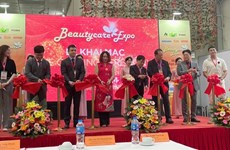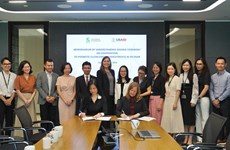Vietnam grows strongly after 10 years of joining WTO
Vietnam has been developing strongly after joining the World Trade Organization (WTO) 10 years ago thanks to expansion of relations and reform policies.
 A photo of Ho Chi Minh City (Source: VNA)
A photo of Ho Chi Minh City (Source: VNA)Hanoi (VNA) – Vietnam has been
developing strongly after joining the World Trade Organization (WTO) 10 years
ago thanks to expansion of relations and reform policies.
The admission to the WTO opened a wide door for the Southeast Asian country to enter the global playground, experts said.
According to the Ministry of Industry and Trade, Vietnam has maintained an annual average economic growth of 6.29 percent since 2007 despite impacts from the global financial and public debt crises.
Vietnam’s per capita gross domestic product (GDP) increased from just 730 USD in 2006 to 2,228 USD in 2015 and reached 2,445 USD in 2016.
The economic structure has shifted towards increasing the proportion of industry and services while reducing the ratio of agriculture.
Notably, Vietnam has recorded an annual export growth of 12-14 percent since it became a member of the WTO. In 2016, the country’s export turnover increased by 3.5 times against 2006.
Moreover, after 10-year membership, Vietnam has attracted over 22,000 foreign direct investment (FDI) projects with a total registered capital of nearly 300 billion USD. Particularly, many global leading groups such as Samsung, LG, Toyota, Honda and Canon have selected Vietnam as a manufacturing base.
The country has already signed 12 bilateral and multilateral free trade agreements (FTA) and concluded negotiations on the EU-Vietnam Free Trade Agreement (EUFTA) and the Vietnam-Korea Free Trade Agreement (VKFTA), including new-generation pacts with high commitments such as the Trans-Pacific Partnership (TPP) Agreement.
Vietnam is also forging ahead with negotiations on four other FTAs, including the Regional Comprehensive Economic Partnership (RCEP), which is expected to become a century FTA stipulating all trade activities of the whole ASEAN region.
Such agreements are opening up opportunities for Vietnam to develop stronger and have free trade relations with 55 global partners, including those in G7 and 15 out of the G20 members.
Former Deputy Minister of Industry and Trade Luong Van Tu, who was once WTO chief negotiator, said after joining the WTO, Vietnamese businesses have seized opportunities as the flow of FDI into the country surged. They have also accumulated experience and received technologies and management skills from big companies of developed nations such as the US and Japan.
The competition pressure also helped domestic enterprises grow stronger. Many firms have proactively sought markets and boost linkages foreign partners to promote exports, he added.
Chairman of the Board of Directors of Tien Phong Plastic Joint Stock Company Tran Dang Phuc said to integrate deeper into the international market, domestic businesses need to draw up investment strategies, develop brand names, competitive edge and production equipment while applying energy-saving and environmentally friendly technologies.
Former WTO Director-General Pascal Lamy said Vietnam is a successful example of international integration as the country has taken advantages of human resources and labour productivity. Its dominant sectors include electronics, garment-textiles and farm produce.
Minister of Industry and Trade Tran Tuan Anh said the 10-year WTO membership is not a long journey but it has brought both opportunities and challenges to Vietnamese enterprises. The proportion of trade and services is kept at 40-45 percent of the nation’s GDP, he noted.
The admission to the WTO not only marked Vietnam’s significant development in global economic integration but also created a foundation for the country to obtain sustainable socio-economic development, he added.
Vice President of the Central Institute for Economic Management Vo Tri Thanh said Vietnam needs to adopt policies to help businesses increase competitiveness edge and to pay attention to the supporting industry.
To continue developing sustainably, experts said Vietnam also needs breakthrough reforms, especially addressing shortcomings in the one-door mechanism and reforming the State administrative apparatus.
In addition, the country is also advised to improve the efficiency of the market inspection and control, and building a healthy business environment.
The experts also recommended Vietnam to restructure businesses, developing infrastructure services and green logistics as well as increasing investment in science-technology to create products with high added value for exports.-VNA
The admission to the WTO opened a wide door for the Southeast Asian country to enter the global playground, experts said.
According to the Ministry of Industry and Trade, Vietnam has maintained an annual average economic growth of 6.29 percent since 2007 despite impacts from the global financial and public debt crises.
Vietnam’s per capita gross domestic product (GDP) increased from just 730 USD in 2006 to 2,228 USD in 2015 and reached 2,445 USD in 2016.
The economic structure has shifted towards increasing the proportion of industry and services while reducing the ratio of agriculture.
Notably, Vietnam has recorded an annual export growth of 12-14 percent since it became a member of the WTO. In 2016, the country’s export turnover increased by 3.5 times against 2006.
Moreover, after 10-year membership, Vietnam has attracted over 22,000 foreign direct investment (FDI) projects with a total registered capital of nearly 300 billion USD. Particularly, many global leading groups such as Samsung, LG, Toyota, Honda and Canon have selected Vietnam as a manufacturing base.
The country has already signed 12 bilateral and multilateral free trade agreements (FTA) and concluded negotiations on the EU-Vietnam Free Trade Agreement (EUFTA) and the Vietnam-Korea Free Trade Agreement (VKFTA), including new-generation pacts with high commitments such as the Trans-Pacific Partnership (TPP) Agreement.
Vietnam is also forging ahead with negotiations on four other FTAs, including the Regional Comprehensive Economic Partnership (RCEP), which is expected to become a century FTA stipulating all trade activities of the whole ASEAN region.
Such agreements are opening up opportunities for Vietnam to develop stronger and have free trade relations with 55 global partners, including those in G7 and 15 out of the G20 members.
Former Deputy Minister of Industry and Trade Luong Van Tu, who was once WTO chief negotiator, said after joining the WTO, Vietnamese businesses have seized opportunities as the flow of FDI into the country surged. They have also accumulated experience and received technologies and management skills from big companies of developed nations such as the US and Japan.
The competition pressure also helped domestic enterprises grow stronger. Many firms have proactively sought markets and boost linkages foreign partners to promote exports, he added.
Chairman of the Board of Directors of Tien Phong Plastic Joint Stock Company Tran Dang Phuc said to integrate deeper into the international market, domestic businesses need to draw up investment strategies, develop brand names, competitive edge and production equipment while applying energy-saving and environmentally friendly technologies.
Former WTO Director-General Pascal Lamy said Vietnam is a successful example of international integration as the country has taken advantages of human resources and labour productivity. Its dominant sectors include electronics, garment-textiles and farm produce.
Minister of Industry and Trade Tran Tuan Anh said the 10-year WTO membership is not a long journey but it has brought both opportunities and challenges to Vietnamese enterprises. The proportion of trade and services is kept at 40-45 percent of the nation’s GDP, he noted.
The admission to the WTO not only marked Vietnam’s significant development in global economic integration but also created a foundation for the country to obtain sustainable socio-economic development, he added.
Vice President of the Central Institute for Economic Management Vo Tri Thanh said Vietnam needs to adopt policies to help businesses increase competitiveness edge and to pay attention to the supporting industry.
To continue developing sustainably, experts said Vietnam also needs breakthrough reforms, especially addressing shortcomings in the one-door mechanism and reforming the State administrative apparatus.
In addition, the country is also advised to improve the efficiency of the market inspection and control, and building a healthy business environment.
The experts also recommended Vietnam to restructure businesses, developing infrastructure services and green logistics as well as increasing investment in science-technology to create products with high added value for exports.-VNA













